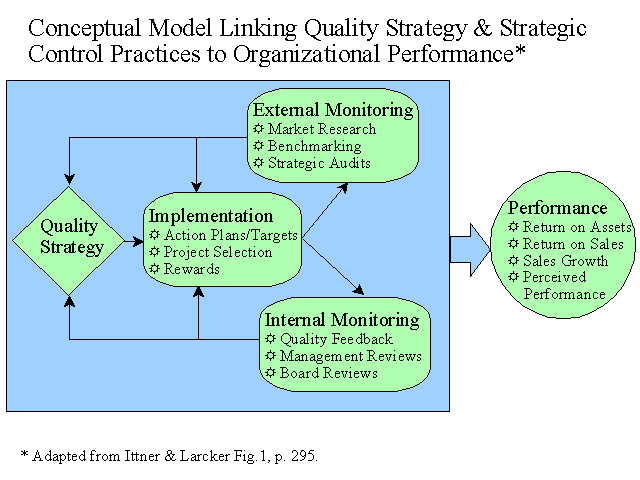
Note by James R. Martin, Ph.D., CMA
Professor Emeritus, University of South Florida
German Accounting Main Page | Japanese
Management Main Page | Quality Main Page
The purpose of this paper is to examine the relationship between the use of a quality-oriented strategy and the use of strategic control practices, whether this relationship is stronger in Japanese firms than in German and North American firms, and whether the strength of this relationship is associated with higher organizational performance.
The Conceptual Model
The conceptual model used in the study appears below and shows the three elements of a strategic control system, i.e., strategy implementation, external monitoring, and internal monitoring.

Hypotheses and Results
The authors use both survey data and field data to test three hypotheses. The hypotheses along with some interesting results are provided below.
H1: "The extent to which an organization follows a quality-oriented strategy is positively related to its use of formal quality-related strategic control practices" (p. 296).
Results: Analysis of survey data from four countries and two industries (auto and computer) support this hypothesis. However, this relationship is stronger for American and German firms and strong for Japanese firms regardless of their strategic orientation.
H2: "The association between an organization's emphasis on quality in its strategic plan and its use of formal quality-related strategic control practices is greater in Japanese organizations than in German or North American organizations" (p. 297).
Not supported. Japanese firms use strategic control systems for monitoring quality strategies regardless of their competitive strategy.
H3: "Organizational performance is an increasing function of the match between the organization's quality strategy and its use of formal quality-related strategic practices" (p. 297).
The results provide mixed support. Several practices show negative correlations with performance indicating that formal strategic control systems can inhibit performance and that informal strategic control systems may be more appropriate in rapidly changing environments.
_______________________________________________
Related summaries:
Chenhall, R. H. 2003. Management control system design within its organizational context: Findings from contingency-based research and directions for the future. Accounting, Organizations and Society 28(2-3): 127-168. (Summary).
Chenhall, R. H. and K. Langfield-Smith. 1998. The relationship between strategic priorities, management techniques and management accounting: An empirical investigation using a systems approach. Accounting, Organizations and Society 23(3): 243-264. (Summary).
Fullerton, R. R. and C. S. McWatters. 2002. The role of performance measures and incentive systems in relation to the degree of JIT implementation. Accounting, Organizations and Society 27(8): 711-735. (Summary).
Kaplan, S. E. and J. T. Mackey. 1992. An examination of the association between organizational design factors and the use of accounting information for managerial performance evaluation. Journal of Management Accounting Research (4): 116-130. (Summary).
Sim, K. L. and L. N. Killough. 1998. The performance effects of complementarities between manufacturing practices and management accounting systems. Journal of Management Accounting Research (10): 325-346. (Summary).